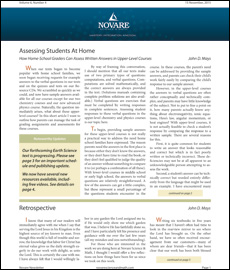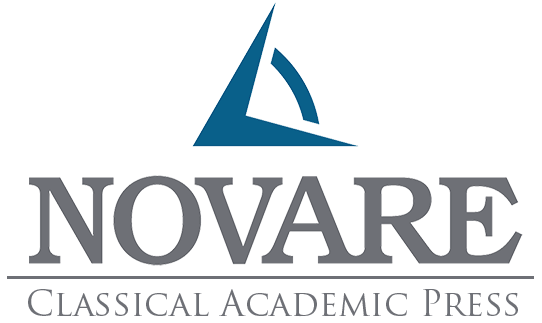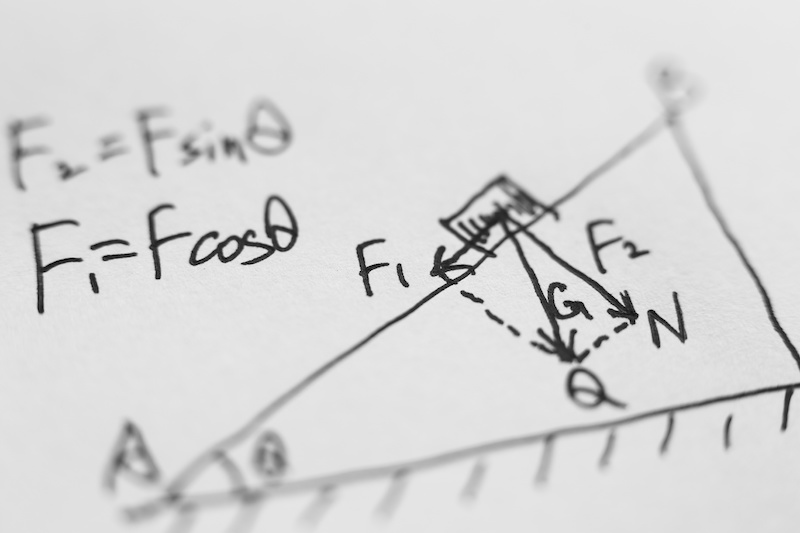- Two Articles: 1) Assessing Students at Home – What can homeschooling parents do when trying to grade their student’s advanced science assignments 2) Retrospective – A view of Novare’s first 3 years
Assessing Students at Home
by John Mays

In this short article I want to outline how parents can manage the task of grading assignments and assessments for upper grade courses. By way of framing this conversation, I should mention that all our texts make use of two primary types of questions: computations, and verbal questions. Computations are solved mathematically, and the correct answers are always provided in the text. Verbal questions are exercises that must be completed by writing responses in complete sentences. Assessing student responses to these verbal questions in the upper-level chemistry and physics courses is our topic here.
To begin, providing sample answers for these upper-level courses is not really a practical way to address the need home school families have expressed. The reason parents need the answers in the first place is because either they don’t know the answers, or they don’t have time to read the book, or they don’t feel qualified to judge the quality of an answer without something to compare it to (or perhaps a combination of all these).
With lower-level courses in middle school or early high school, the answers to verbal questions are relatively straightforward. A few of the answers can get a little complex, but these represent a small percentage of the questions students encounter in the course. In these courses, the parent’s need can be addressed by providing the sample answers, and parents can check their child’s work fairly easily by comparing the child’s response to our sample answer.
However, in the upper-level courses the answers to verbal questions are often rather conceptually and technically complex, and parents may have little knowledge of the subject. Not to put to fine a point on it, how many parents actually know anything about electronegativity, ionic equations, Hess’s law, angular momentum, or heat engines. With upper-level courses, it is not actually feasible to check a student’s response by comparing the response to a written sample. There are several reasons for this.
First, it is quite common for students to write an answer that looks reasonable and correct but which is in fact poorly written or technically incorrect. These deficiencies may not be at all apparent to an unknowledgeable person attempting to assess the work.
Second, a student’s answer can be technically correct but worded entirely differently from the language that might be used in an example. I have encountered many occasions when students formulated excellent answers to sophisticated questions, but did so using concepts and vocabulary that I would not have used. This is always very impressive to see, but you can see that it is not possible to anticipate this by providing canned answers to which you can compare the student’s work. In such cases, only a person who fully understands the topic at issue can assess the student’s response.
Third, it can even happen (and does) that a student has no idea how to answer the question but remembers a few buzzwords from the chapter which he or she compiles into sentences. (I whimsically call these “shotgun answers”: the student doesn’t know the answer to the question, but packs his “shotgun” with buzzwords and “blows” them onto the page, hoping to get some credit.) I have seen cases of this when even teachers who know the subject have been tricked into thinking that the student knows what he or she is talking about.
So if parents can’t check their child’s verbal answers on an exam by comparison to an example answer, what are they to do? I have a method to offer in response to this question, but first I feel compelled to note that this problem is inherent in home schooling upper-level students; it sort of comes with the territory. Moreover, questions framed with fill-in-the-blank or multiple choice answers that can be checked somewhat objectively typically don’t do much to require conceptual thinking. To engage the student in higher-level critical or conceptual thinking, students necessarily must respond to technically complex questions, and parents will often find themselves in the awkward position of not knowing how to judge the student’s response.
Here is my advice on how to manage this. The process I recommend for scoring chapter exercises is different from that for scoring exam responses. For chapter exercises, parents can require the student to write the response and then turn to the page in the text where the topic is addressed. The student can then support his or her response by citing relevant passages in the text, that is, by writing down the page and paragraph (or section and paragraph) where answer is found. For a complex question, the answer may not be found written verbatim in the text; it may instead require combining ideas from several different paragraphs. The student should be required to support his or her answer by citing these locations in the text.
When assessing this written work, the parent grader merely checks to see that the work is supported by appropriate citations. It is the student’s responsibility to ensure that the citations are legitimate and that he or she actually understands the question and can formulate an appropriate response to it. For exam responses, the student first takes the exam and “turns in” the paper to the person who will grade it. That person can review the paper for completeness and so on, and then hand the paper back to the student for compiling citations. The student then finds the relevant passages in the text and adds the citations to the test paper using, say, a colored pen to distinguish these additions from the original responses on the paper.
As a final step, the student and grader review the responses and citations together. This final step is necessarily suboptimal. The best results will occur if the student is diligent and honest and can form an honest judgement of how well he or she has answered the question. Otherwise, the parent grader will need to listen to the student explain his or her response, read the material from the chapter, and demonstrate that the response is adequate. Note that the parent grader is still in the position of trying to judge a response to a question he or she may not know anything about. There is no way around this dilemma. But the value here is that instead of the parent trying to judge the answer by comparing it to a written example, the student is the one who provides reasoned argument based on sources. The parent is now in the position of assessing whether the student knows what he or she is talking about. This explanation method is far easier to do than trying to judge a response absent of any such explanation or justification.
We are surrounded by analogous situations. What is easier—to read a written instructional manual on how to operate your smart phone, or to have someone explain it to you? Or maybe a better analogy is if you want to understand a local bond issue to be voted on in your city. Reading about it without verbal interaction can be challenging. You might understand neither the issue nor how your priorities would incline you to vote. But a supporter or opponent of the bond issue can quickly explain her position, pointing to the language in a written text to justify her statements.
On a technically complex issue, you might have to ask a few questions to clarify points or press the person on aspects to the issue she hasn’t addressed, but we would probably all agree that in most cases we would be able to tell after a few minutes whether the representative was well-informed and trustworthy.
To conclude, we do not currently plan to produce sample answers keys for the questions in our upper-level texts. If students are to be cognitively challenged in their upper-level science courses, they have to write responses to complex questions. Assessing these responses is not a simple matter, but can be managed using the approach outlined here. This approach will certainly require some time. The student will gain by defending his or her work and justifying it by supporting citations. The parent grader should be able to assess the student’s understanding because it is relatively easy to tell if your own child knows what he or she is talking about. And both parent and child will profit from the time spent together. That, of course, is one of the chief attractions of home schooling in the first place.
Retrospective
I know that many of our readers will immediately agree with me when I say that serving the Lord Jesus in his Kingdom is the highest source of joy known to man. Even though this world is full of trouble and sorrow, the knowledge that labor for Christ has eternal value gives us the daily strength eagerly to do our work with delight, as unto the Lord. This is certainly the case with me. I have always felt that I would willingly labor in any garden the Lord assigned me to, if He would only show me which garden that was. I believe He has faithfully done so, and I have particularly felt his presence and guidance with me over the last few years (all my mistakes and sins notwithstanding).For those who are interested in the work we are doing here at Novare Science & Math, I thought I would offer a few reflections on how things have been for us since we took on this work.
Writing six textbooks in five years has meant that I haven’t often had time to look in the rearview mirror to see where the Lord has brought us. On the other hand, we have so often received encouragement from our customers—many of whom are dear friends—that it has been clear that our work has been both blessed and appreciated. Typical example: A person writes in to tell us of an error they found in a text. When I reply to thank them for the information, the most common response to my reply is a friendly, “I am glad I can help! Thank you for all you are doing!” The Lord has sent us a near-constant stream of such encouragement over the last five years and it has provided succor on many a weary night. People have even thanked us when they had to return a book for a refund!
What follows is a brief retrospective on how far we’ve come. It goes without saying—but I’m saying anyway—that you, the schools and home school families using our materials, have been used by the Lord to bring us here.
In the fall of 2012, we had one manual, The Student Lab Report Handbook, one paperback, Teaching Science so that Students Learn Science, and one textbook, Accelerated Studies in Physics and Chemistry. Truthfully—and this is the honest inside story— we didn’t even know at that time that we were about to launch into a major program of textbook and curriculum development. The Lord showed that to us a little later.
And speaking of what the Lord has done, I am here to testify that he has given us each year exactly what we needed to keep going for one more year. I remember back to the fall of 2012 when we were at a very large conference in Dallas with our booth introducing folks to our new materials. That week we met a lady (whom we have talked to many times since) who told us: “We really need what you guys are doing. Just find a way to hang in there. It takes a few years to get going, but don’t give up.” In everything from encouragement to contacts to revenue to new schools, our kind Father, who always gives good gifts to His children, has given us all we need.
Back again to the fall of 2012, in that school term we had five schools using our first text. I was not surprised that the school where I was teaching had adopted ASPC, but it was edifying to have four other schools trust us at that early time when our curriculum was one book deep.
The following year our five schools had increased to an encouraging 30 schools. The next year (2014) it was over 60 and this year it is over 90. There is something very stimulating about this arithmetic series: each year the number of schools is equal to the previous year’s number plus 30. Or, expressed in mathematical notation (as we math teachers can’t resist doing),
Ni = Ni-1+ 30
Well, as the schools have multiplied, so has our catalog. Amazingly, we now have some 40 active products with an ISBN! This seems astounding. We have also now published three books with authors who are not me, and we are now starting two more new projects with other authors. One of these is the long-awaited General Biology text. Yes folks, the first chapter is being written as we sit here and we hope to have it ready in a couple of years. To say the least, this is an answer to prayer!
Honestly, I could go on and on. I could talk about the vertiginous learning curve we have been on, the large number of people we now know who bless us every time we see them with their encouragement and prayers, the new distributors now marketing Novare products, and the roll out—going on right now—of our new imprint, Centripetal Press, that allows us to take our ideas into Charter Schools, international schools, and other places we cannot go with our overtly Christian Novare texts.
Our steady growth means that this year appears to be the final year of our start- up. As the Lord is willing, next year we will be a going concern, as in it appears we will make a profit for the first time. This too is by God’s grace: He has prospered the work of our hands.
If I am sounding like someone holding forth on Testimony Night, it is because that is exactly what I am doing. I am testifying that our God is Ruler and Maker of the cosmos; Friend to the friendless; the Hope of the nations; Balm to the weary soul; the very Reason for, Meaning behind, and Ground of everything that exists; the Author of Life drawing the creation forward to the fulfillment He purposes; and the Eternal King Whose Kingdom will know no end. His Kingdom is the Kingdom of our Lord and of His Christ and He shall reign forever and ever. This is the One we are working for—who knows us by name and shares in His heart our every tear and yearning. And perhaps most astounding of all is the fact that the Mighty One, God, should condescend to notice us ( What is man that you are mindful of him? ), take on flesh and all the woes that go with it, sacrifice himself on our behalf, and then include us in His holy and eternal Kingdom work. What wondrous love is this!? Praise my soul the King of Heaven!
I am done expounding on our company’s growth. From the beginning, my attitude has been that the Lord is the one we serve and He will be the one governing our future. Our role is to serve with excellence and gusto, as unto the Lord, and that is what we have sought to do. Everything that we now have is from His hand. This is not news to you, of course, for who does not know that He owns the cattle on a thousand hills? But every time I stop to take a breath, I thank Him. And then I thank Him for you.
And then I thank Him for allowing me the joy of writing books for yet another year. I do love what I do. Praise be to Him.
[ctct form=”6062″]

